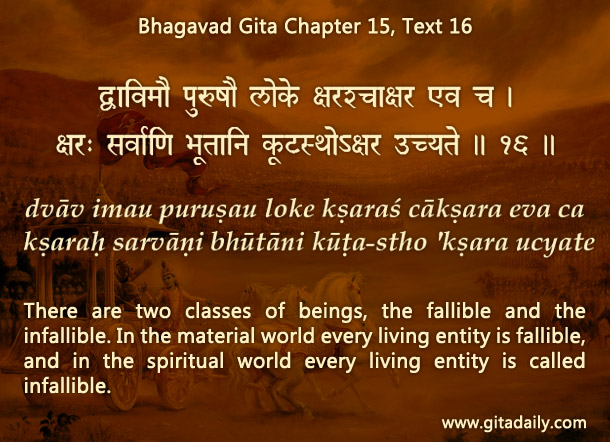
Many people conceive of spiritual perfection as a state of absolute oneness, wherein one’s sense of personal identity is dissolved in the impersonal absolute.
This conception has two crippling problems: it reflects neither the scriptural conclusion, nor the heart’s most cherished longing for love.
Scripture certainly refers to the state of oneness as a spiritual perfection, but not as the supreme spiritual perfection. For example, the Bhagavad-gita (15.16) refers to the liberated souls as kuta-stha, a word that connotes the unchangeability frequently associated with oneness. Yet the very next verse (15.17) clarifies that such souls are not at the highest level of perfection – that status is reserved for the Supreme Soul, Krishna. And two verses later, the Gita (15.19) states that those who know Krishna’s position as the Supreme Person become the knowers of everything. Significantly, the same verse concludes that such enlightened people worship Krishna wholeheartedly. So, enlightenment doesn’t nullify their devotion, as should have happened if enlightenment meant realizing one’s oneness with the Supreme. Instead, it intensifies their devotion, conveying thereby that enlightenment is characterized by realization of an eternal twoness – the eternal co-existence of the soul and the Supersoul, Krishna.
And such twoness is essential for the fulfillment of our heart’s most cherished longing for love.
And if we think objectively, the existence of love requires necessarily the pre-existence of the lover and the beloved. And the eternality of love requires the eternality of the lovers. Their oneness is not ontological, but emotional – the union of hearts relished. The greater this feeling of oneness, the deeper the love. But the depth of love or even its very existence is impossible without the lovers being two distinct people.
Thus does the twoness of the lovers underlie the oneness of love.


Merging into the Brahmajyoti is such an overpowering happiness that we easily consider it to be the end-all of self-realization. We need cosmic sunglasses to see through the overwhelming brightness of the Brahmajyoti but many of us are mesmerized with the light like moths and we don’t make it past its enormous brightness. Then our individuality ‘dies’ and we find ourselves floating beyond birth and death sometimes for millions and millions of years. This oneness with the radiation of the Lord can make us believe that we are one with the Lord not knowing it is just the first stage of enlightenment and a portal to higher realization. Eventually, by the unlimited mercy of Lord Sri Krishna, a longing will emerge to share this oceanic happiness. Then we realize that our oceanic experience of happiness is just a drop at the feet of an infinite greater Ocean of happiness. Instead of consuming our happiness we can now offer it the Source of all happiness, Lord Sri Krishna. This new and emerging ‘attitude of giving’ is noticed by the Lord and He responds by giving us the means to develop an intimate relationship with Him that initiates an infinite greater happiness than the oneness we experienced in the Brahajyoti. That reminds me of a story of a mouse that was stamping with an elephant on a bridge. At first the mouse thought it was stamping really hard but then, when it looked up, it realized it was the stamping together with the elephant that made the sound so loud. Eventually when the mouse humbly saw its actual position it realized that it was the elephant that was making all the noise.